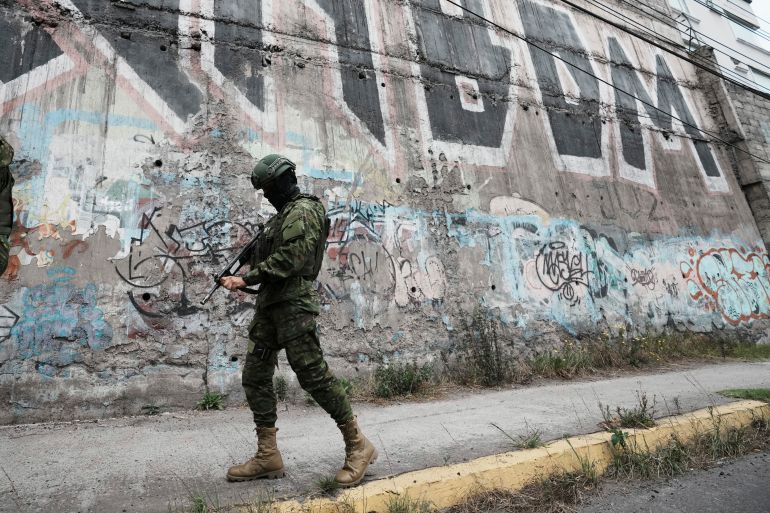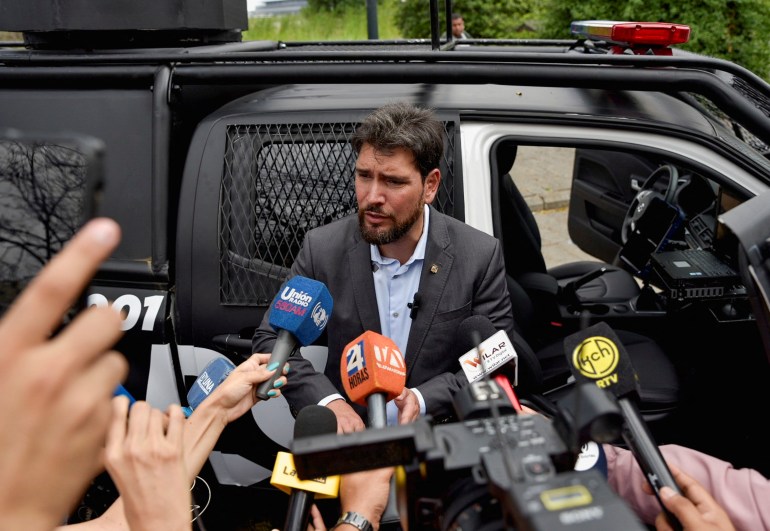Human rights commission denounces murder of third politician in Ecuador
The Inter-American Commission on Human Rights has urged solutions to the political violence unfolding before Ecuador’s elections.

The Inter-American Commission on Human Rights has condemned the assassination of a third Ecuadorian politician in less than a month, calling for an end to the bloodshed.
In a social media post on Tuesday, the organisation wrote that it “urges the state [of Ecuador] to diligently investigate and strengthen measures to prevent political violence”.
Keep reading
list of 3 itemsWhat does the assassination of a presidential candidate mean for Ecuador?
Is Ecuador succumbing to gang violence and organised crime?
The latest shooting took place on Monday, outside the coastal city of Esmeraldas. Pedro Briones, a local leader for the left-wing Citizen Revolution Movement, was gunned down outside his home in the rural San Mateo parish, according to the newspaper El Universo.
Two suspects reportedly approached Briones on a motorcycle, shooting him in the neck. He was pronounced dead at a nearby hospital.
Ecuador is days away from holding snap elections on August 20, after President Guillermo Lasso used his constitutional power to dissolve the National Assembly and end his presidency in May.
But the country has recently seen a spike in homicide and drug crime as drug cartels increasingly take advantage of Ecuador’s prime location, on the coast between cocaine-producing regions in Peru and Colombia.

Briones hailed from the same political party as the frontrunner for the presidency, Luisa González.
In the wake of his death, she and other party leaders took to social media to remember the political organiser.
“Ecuador is living through its bloodiest era,” González wrote on X, formerly known as Twitter. “We owe this to the total abandonment of an inept government and a state taken over by mafias.”
She called for “urgent” change, promising a “strong hand against crime”.
“Mano dura” or “strong hand” anti-crime tactics have found renewed popularity in certain parts of Latin America, including El Salvador, where President Nayib Bukele has suspended civil liberties to orchestrate a mass crackdown on gang violence.
In Ecuador, other leading presidential candidates like the conservative businessman Jan Topić – whom critics call the “Ecuadorian Bukele” – have likewise campaigned with tough-on-crime platforms, particularly in the wake of the recent violence.
“How many more leaders, how many more citizens must fall for this violence that we’re living through to cease?” Topić wrote on X. “This has to change! We are going to apply a strong hand to criminals to restore peace to our country.”

Briones’s death occurred less than a week after a presidential candidate was killed in a separate shooting. National Assembly member Fernando Villavicencio was concluding a presidential campaign stop in the capital Quito when he was shot in the head on August 9.
And on July 23, Agustín Intriago, who had recently been reelected as mayor of the port city Manta, was killed when a gunman allegedly drove by in a stolen pick-up truck.
A local football player, Ariana Estefanía Chancay, was also killed in the attack.
Police continue to investigate the shootings and six Colombian suspects have been arrested so far for Villavicencio’s assassination. A seventh reportedly died during the shooting when Villavicencio’s security detail responded to the attack with gunfire.
Villavicencio, a former journalist, had been an outspoken critic of corruption, particularly during the administration of former President Rafael Correa.
His death featured prominently in a Sunday night debate between the remaining candidates, who touted their solutions to the rise in violent crime.